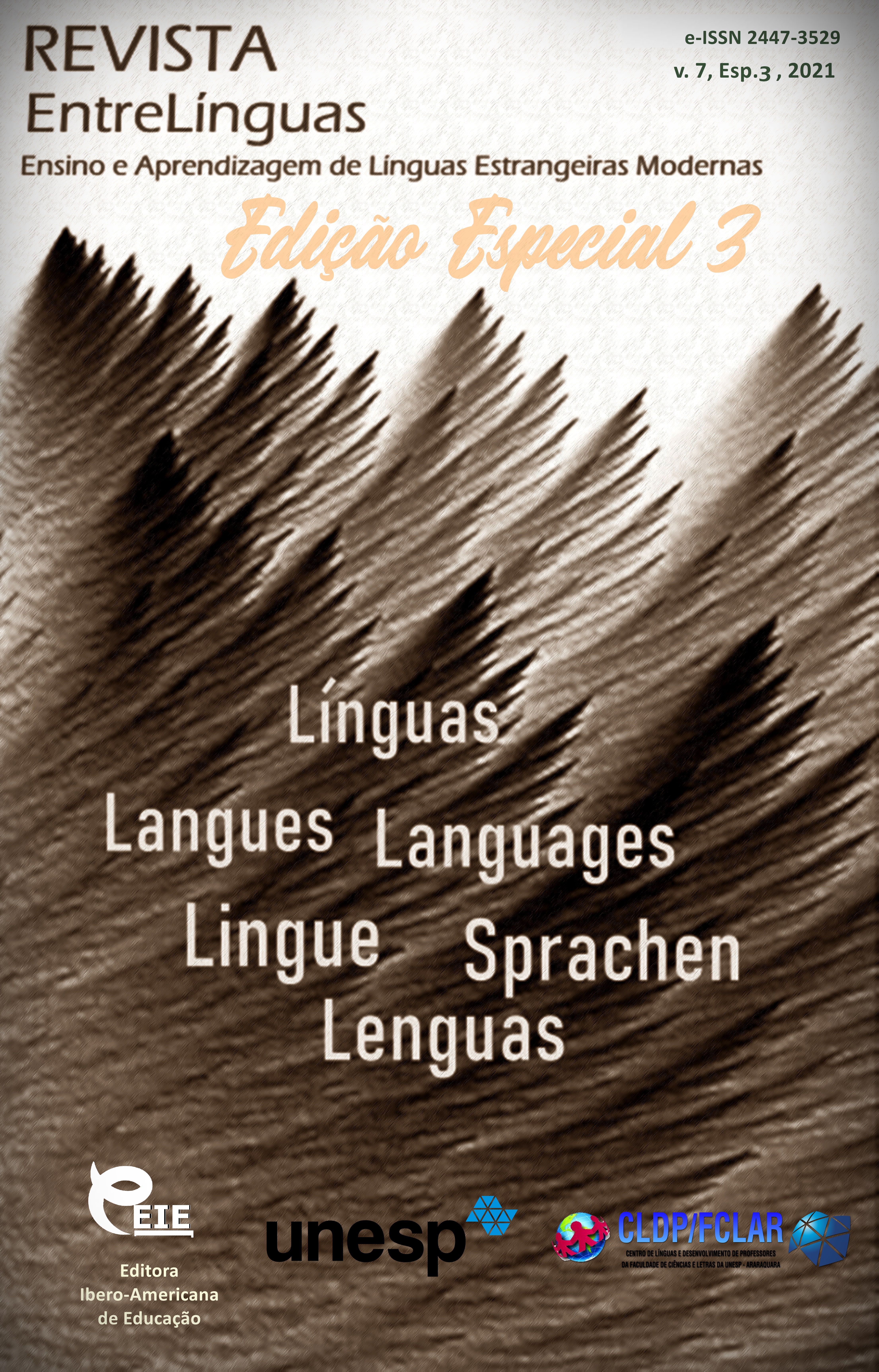Developing intercultural competence: a model based on introducing a literary analysis in a foreign language classroom
DOI:
https://doi.org/10.29051/el.v7iesp.3.15704Keywords:
Intercultural communication, Education, Student, Intercultural Competence (IC), Literary analysis, Foreign language, Pedagogic modelling, HumanitiesAbstract
This article is concerned with developing students' intercultural competence through teaching literary analysis as a part of teaching foreign languages and linguistics in higher education. The objective of the research is to design a model of developing intercultural competence through literary analysis in a foreign language class. Modelling was applied as the leading method of the research as it regards the process of IC (intercultural competence) development as a task-oriented and organized pedagogical process. The submitted didactic model should develop the IC through knowledge, skills, a system of values, reflection and positive attitude to the culture under study, so it includes components such as objectives, motivation, organization, content, and evaluation; it determines the pedagogical conditions, organization, teaching methods and tools that together provide the targeted result. The formative experiment introduced the model into practice in a foreign-language class at university and showed positive results in developing the students' intercultural competence. The model provides pedagogical support of the process of developing IC as a part of foreign language teaching and can be applied within language, literature and linguistics-related courses.
Downloads
References
ABUZYAROVA, D. L.; TAKHTAROVA, S. S.; KUZMINA, O. D. Concept ordnung and german communicative style: problems of intercultural communication.Opcion, v. 35, n. esp. 22, p. 255-266, 2019.
BANDURA, A. Social foundations of thought and action: a social cognitive theory. Englewood Cliffs, NJ: Prentice Hall, 1986.
BYRAM, M.; GRIBKOVA, B.; STARKEY, H. Developing the intercultural dimension in language teaching. Strasbourg: Language Policy Division Directorate of School, Out-of-School and Higher Education DGIV Council of Europe, 2002
BYRAM, M.; NICHOLS, A.; STEVENS, D. Developing intercultural competence in practice. Clevedon, UK: Multilingual Matters, 2001.
CEFR. Common European Framework of reference for languages: learning, teaching assessment. Cambridge University Press, 2001. Available: www.coe.int/lang-CEFR. Access: 10 Dec. 2020.
DEARDORFF, D. Assessing intercultural competence. New Directions for Institutional Research, n. 149, p. 65-79, 2011. DOI: doi.org/10.1002/ir.381
DIMITROVA-GYUZELEVA, S. A reactive approach to teaching english through literature. In: BETA-IATEFL ANNUAL INTERNATIONAL CONFERENCE, 24., 2015, Sófia. Proceedings […]. Sófia, Bulgaria: University of National and World Economy, 2015. Available: http://www.beta-iatefl.org/cogitoergosum/wp-content/uploads/2015/08/BETA-IATEFL-Newsletter_July_August_2015.pdf. Access: 10 Dec. 2020.
FANTINI, A. E. Assessing intercultural competence: a YOGA Form. Brattleboro, VT: TESOL, 1999.
FANTINI, A. E. New ways in teaching culture. Alexandria, VA: TESOL, 1997.
HOLLAND, C. J.; KOBASIGAWA, A. Theories of learning: a comparative approach. Itasca, 1980.
INCA PROJECT. 2009. Available: https://ec.europa.eu/migrant-integration/librarydoc/the-inca-project-intercultural-competence-assessment. Access: 10 Dec. 2020.
KOZLOVA, Y. A.; KADYROVA, A. A.; SAKHIBULLINA, K. A. Problems of testing application in foreign language learning control. Humanities and Social Sciences Reviews, v. 7, n. 6, p. 53-59, 2019.
NIKOLAEVA, О. Anti-drug propaganda by means of teaching english to the students. Philological Sciences. Issues of Theory and Practice, v. 8-1, n. 26, p. 123-127, 2013.
PASSOV, E. I. A communicative method of teaching speaking a foreign language. Prosveschenie. Moscow, 1985.
RAKHIMOV, A. Z. Psychodidactics: teaching material. UFA, 1996.
SABIROVA, D. R. et al. Comprehension of the english national character in building professional linguistic culture. Journal of Educational and Social Research, v. 9, n. 3, p. 101-106, 2019.
VERJANS, S. et al. Online CEF-based assessment of oral proficiency for intercultural professional communication. In: CEFcult Framework and Methodology. 2011. Retrieved from: https://www.academia.edu/2833714/Online_CEF_based_assessment_of_oral_proficiency_for_intercultural_professional_communication. Access: 10 Dec. 2020.
Published
How to Cite
Issue
Section
License

This work is licensed under a Creative Commons Attribution-NonCommercial-ShareAlike 4.0 International License.
Os manuscritos aceitos e publicados são de propriedade da Revista EntreLínguas. Os artigos publicados e as referências citadas na Revista EntreLínguas são de inteira responsabilidade de seus autores.
Transferência de direitos autorais – autorização para publicação
Caso o artigo submetido seja aprovado para publicação, já fica acordado que o(s) autor(es) autoriza(m) a UNESP a reproduzi-lo e publicá-lo na EntreLínguas, entendendo-se os termos “reprodução” e “publicação” conforme definição respectivamente dos incisos VI e I do artigo 5° da Lei 9610/98. O artigo poderá ser acessado pela rede mundial de computadores (Internet), sendo permitidas, a título gratuito, a consulta e a reprodução de exemplar do artigo para uso próprio de quem a consulta, desde que haja a citação ao texto consultado. Essa autorização de publicação 328 EntreLínguas, Araraquara, v. 1, n .2, p. 323-328, jul./dez. 2015 não tem limitação de tempo, ficando a UNESP responsável pela manutenção da identificação do(s) autor(es) do artigo. Os artigos publicados e as referências citadas na Revista EntreLínguas são de inteira responsabilidade de seus autores.











